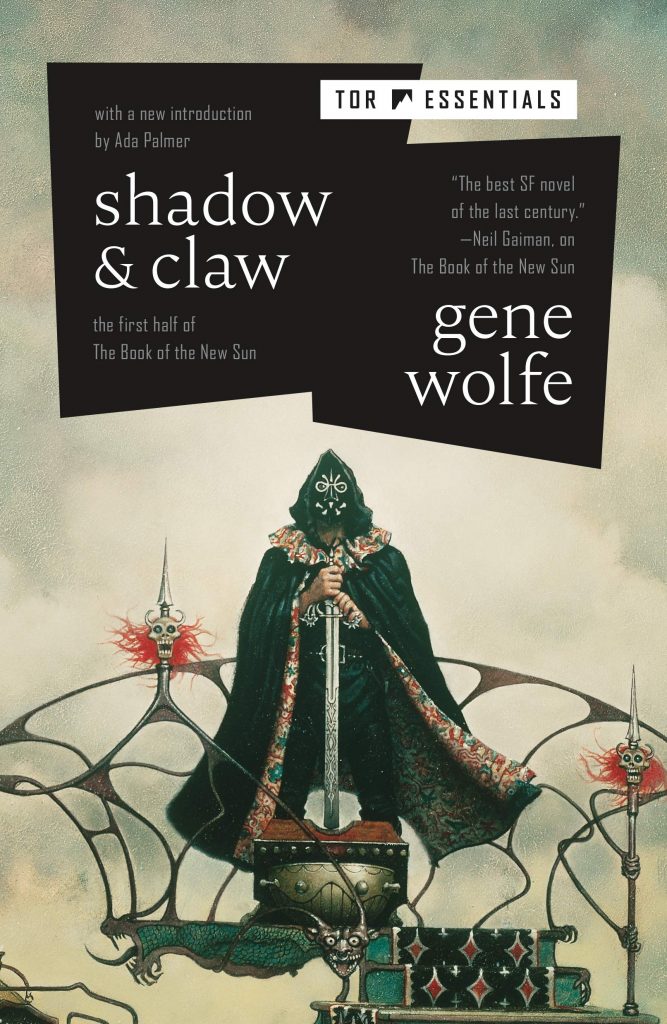Book Review: The Value of Memory in “Shadow and Claw”

First published in 1980, Shadow & Claw by Gene Wolfe (1931-2019) has gone on to be a staple of science fiction’s dying earth subgenre. Originally intended as a novella for an Orbit anthology, it’s now a tetralogy split into two books titled The Book of the New Sun and The Urth of the New Sun. Shadow & Claw covers the first two books of the series (The Shadow of the Torturer and The Claw of the Conciliator), and its reprinted edition will be released on June 8 from Macmillian. Revered for its Christian theological themes and parallels, the first book also explores the importance and erosion of memory.
I’ve received an ARC of Shadow & Claw from NetGalley in exchange for an honest review. All opinions are my own.
In Ada Palmer’s forward (titled The Path of the New Sun) for this edition of Shadow & Claw, she points out the absence of clutter from most imagined futures. Civilizations built over past ruins; histories overwritten to fit the dominant narrative. Science fiction showcases the idea of unity and progress, but of course, that’s not always the case. The post-apocalyptic genre, in particular, definitely flips over this notion. Civilization’s fall precedes the disintegration of structures, the decline of past knowledge, and the shift in cultural values. “Modern” technology and structures disintegrate as the descendants of the past adapt and rebuild. The dying earth genre, however, takes this concept further to demonstrate the image of a cluttered future.
Gene Wolfe has painted a fantastical far future where a dying red sun and green moon reign the skies. The accomplishments of past civilizations, including space travel, have dwindled to myths. The narrator, Severian, is an apprentice to the Guild of the Torturers. When he commits the crime of showing mercy toward his victim, the Guild exiles him. From there, he embarks on a journey to learn more about an ancient relic and discover his destiny. In the world of Urth, spaceships, alien species (even Giants!), and other wonders abound, but Severian’s memory makes his story not all that it seems.
Both the narrative and worldbuilding in this novel are cluttered. Severian recounts his time at the Guild, his exile, and his quest through disjointed scenes and sections. Characters go as soon as they come. Severian’s narrative provides contemplative yet fleeting glimpses of the places and people he encounters. Here, people and places are unfinished, blank canvases to ponder on forever. Symbols create people, and the archives don’t catalog everything. Memory is valuable, but Shadow & Claw shows that, for any reason, memory can be purposely altered or erased over time. Urth is a future layered with histories and ancient structures, both on the surface and buried, and nothing is as it seems at first glance.
The reprint of Shadow & Claw comes out June 8th from Macmillian. You can read an excerpt here.
Author: Bradda M.
Bradda M. currently lives in Virginia. He teaches ESOL (English to Speakers of Other Languages) at a public school and spends his free time reading and watching movies each night with his partner. For The Geekiary, he writes about webcomics and SFF media.
Help support independent journalism. Subscribe to our Patreon.
Copyright © The Geekiary
Do not copy our content in whole to other websites. If you are reading this anywhere besides TheGeekiary.com, it has been stolen.Read our






